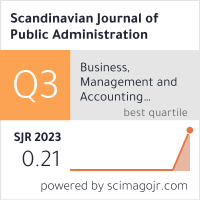Key Stakeholders’ Frames on the Police and Intelligence Agencies’ Online Surveillance Capabilities in Finland
DOI:
https://doi.org/10.58235/sjpa.v26i1.7033Keywords:
online surveillance, online intelligence, q-methodology, intelligence capabilities, policy debateAbstract
Authorities' online surveillance powers touch the very core of democracy, human rights and privacy. Thus, the legislation and its implementation must be both sustainable and legitimate in the eyes of the citizenry. We argue that the general elements of legitimate and sustainable online surveillance system can be derived from many international sources, but the crux of the matter is to adjust the general principles into country-specific conditions through well-informed, reasoned and inclusive national legislation preparation and regular follow-up discussions.
We explored how 25 key stakeholders from various fields consider 45 statements on online surveillance at the time of preparation of the intelligence legislation in Finland in 2018. Q-factor analysis arranged the stakeholders in three factors indicating distinctive frames that we named Balancing privacy and security, Protecting human rights and Expanding surveillance powers. With regard to enhancing further public discussion towards the interests of stakeholders, we also detected ambiguous issues, deal-breakers and areas of consensus that can be used for finding common ground in future considerations. Our study contributes particularly to research on online surveillance policy. We also demonstrate, along with some earlier findings, that Q-methodological research can provide powerful means to feed public policy discussion in the spirit of deliberative democracy.
Downloads
Downloads
Published
How to Cite
Issue
Section
License
Copyright (c) 2022 Anna Leppänen, Jarmo Houtsonen

This work is licensed under a Creative Commons Attribution-NonCommercial-NoDerivatives 4.0 International License.
Authors contributing to Scandinavian Journal of Public Administration agree to publish their articles under a Creative Commons CC BY-NC 4.0 license. This means means articles are free for anybody to read and download, and to copy and disseminate for non-commercial purposes as long as appropriate credit is given, a link is provided to the license, and any changes made are clearly indicated. Authors retain copyright of their work.








